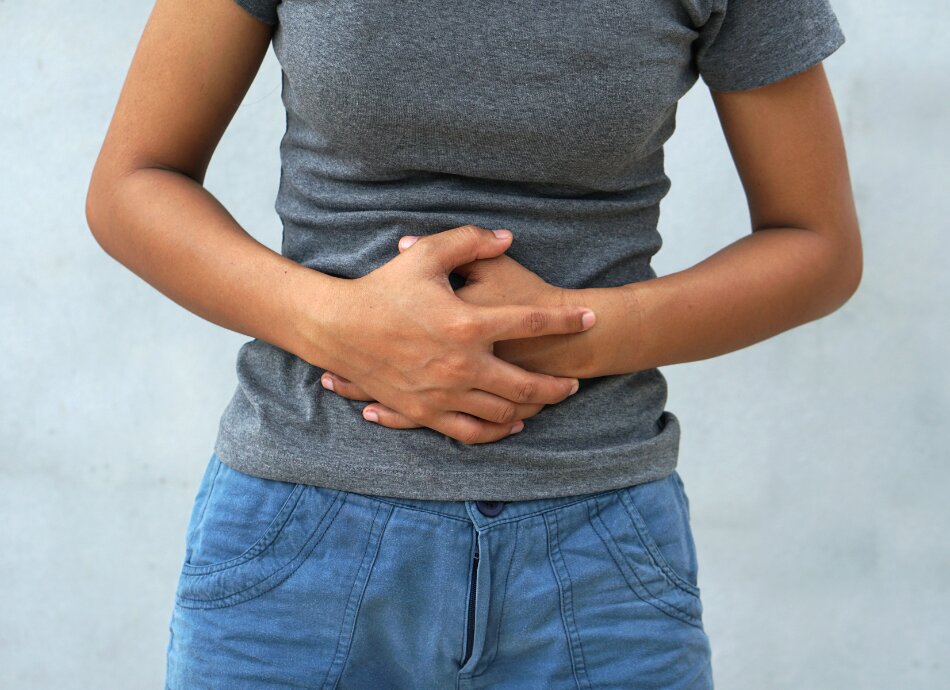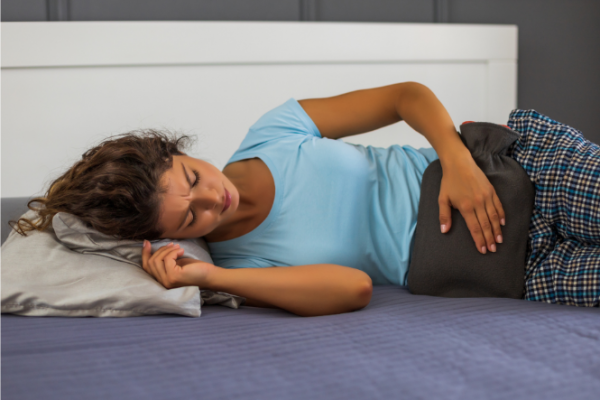If you're a frequent visitor to Healthify, why not share our site with a friend? Don't forget you can also browse Healthify without using your phone data.
Abdominal pain
Key points about abdominal pain
- Pain in your abdomen (stomach or puku) is common. It's important to know what to do and when you need to see a doctor.
- Your abdomen is the part of your body between the bottom of your ribs and the top of your hips. It often gets called your stomach, tummy or puku, but there's a number of other organs in that area too.
- Most pain in this part of your body will pass quickly and can be treated at home by yourself or with medication from your pharmacist. This includes when you have:
- a burning pain or discomfort after eating (indigestion)
- feeling bloated (trapped wind)
- constipation (can’t poo).

If your abdominal pain is mild, and there are no concerning symptoms, these tips may help:
- drink plenty of water
- try a heat pack or hot water bottle where it hurts, or have a warm bath
- take paracetamol to ease pain
- do NOT take aspirin or anti-inflammatory drugs (such as ibuprofen) unless advised to as these can make abdominal pain worse
- avoid alcohol, tea and coffee
- rest your gut by not eating for a few hours, then start again when you feel better on bland foods (such as rice, crackers, bananas or toast)
- lie down and rest
- if constipated, read more about what you can do
- ask your pharmacist about medicines to ease wind, spasms or to stop diarrhoea
- tell your doctor if your medication causes indigestion, constipation or diarrhoea.

Image credit: Canva
When to get help
Contact your healthcare provider or call Healthline (0800 611 116) if:
- your pain is no better after 2 hours of home care
- your abdomen is very painful, eg, if you can’t walk or need to walk bent over, or feel you need to hold your tummy all the time
- your pain gets worse over time, or becomes sharper or stronger in one place
- your abdomen feels bloated or sticks out more than usual
- you have diabetes and are vomiting
- you can’t stop vomiting
- you haven’t had a bowel motion (poo) for 3 days
- you have lost your appetite
- there is blood in your vomit, urine (pee) or bowel motion, or vaginal bleeding that isn’t a period
- you have other symptoms as well, such as fever or dizziness, especially if they get worse or new symptoms develop.
Call 111 and ask for an ambulance or go to your nearest hospital if you:
- have sudden, severe stomach or abdominal pain
- have pain when you touch your abdomen
- are vomiting blood or a ground coffee-like substance
- have bloody or black, sticky poo
- collapse, or become pale and clammy
- are finding it hard to breathe
- can’t pee
- have any tightness or heaviness in your chest
- find the pain spreads up to your chest, neck or shoulder.
It can be difficult to know what is causing pain in your abdomen, and often the pain settles without knowing what caused it or needing any treatment.
Some causes of sudden, severe abdominal pain include:
- gastroenteritis (tummy bug) from an infection, virus or food poisoning
- appendicitis
- gallbladder problems (eg gallstones)
- diverticular disease and diverticulitis
- acute pancreatitis or chronic pancreatitis
- a peptic ulcer in your stomach or duodenum
- heart or lung problems such as angina or heart attack
- urinary tract problems such as kidney stones or urinary tract infection (UTI)
- pelvic problems such as ectopic pregnancy, ovarian cysts
- trauma or injury such as a muscle strain.
Some causes of long-term or recurring abdominal pain include:
- indigestion or wind (flatulence)
- constipation
- irritable bowel syndrome
- Crohn's disease or ulcerative colitis
- lactose intolerance or coeliac disease
- period pain
- side effects from medications (aspirin, iron supplements, antibiotics, pain-relief medicines and more)
If your child has a sore stomach or abdominal pain, see gastroenteritis in children, constipation in children and vomiting in children.
As well as asking where the pain is, your doctor will ask you to describe your pain, so notice whether it's sharp, stabbing, cramping or a dull ache. Also, notice whether the pain is there all the time or if it comes and goes in waves.
Your doctor will also ask if the pain came on suddenly (acute), or whether you have had it for a while (chronic). They will also want to know if you have been sick (vomited) or had diarrhoea (watery, runny poo).
Depending on what they think is causing your abdominal pain, they may want to do further tests.
Often abdominal pain will settle with simple self-care tips such as taking paracetamol, rest and treat any constipation. If not settling, review the sections above as more specific treatment will depend on the cause of the abdominal pain.
If you know the condition causing your abdominal pain, you can go to the Healthify page for that condition to find out what support is available to you.
Call Healthline phone 0800 611 116 for free advice from registered nurses 24 hours a day, 7 days a week, if you are unsure about what to do.
Apps reviewed by Healthify
You may find it useful to look at some pain management apps.
You can keep your gut healthy by eating lots of fruit and vegetables, as well as other foods high in fibre, such as whole grains and legumes. Find out more about healthy eating.
- You can reduce the chance of food poisoning and gut infections by following food safety practices and keeping your hands clean.
- Find out about preventing specific conditions by linking on the related topics and links in the list of causes above.
Abdominal pain(external link) Patient Info, UK, 2015
Abdominal pain in adults(external link) Better Health Channel. Australia, 2012
Bloating(external link) NHS, UK
Flatulence(external link) NHS Choices, UK, 2022
Apps
References
- Stomach ache and abdominal pain(external link) NHS Scotland, UK, 2023
- Hunt, R et al. Coping with common gastrointestinal symptoms in the community – a global perspective on heartburn, constipation, bloating, and abdominal pain/discomfort(external link)(external link) May 2013, WHIO Guideline. Journal of Clinical Gastroenterology, August 2014, 48, 7: 567–578.
- Manterola C, Vial M, Moraga J, Astudillo P. Analgesia in patients with acute abdominal pain(external link). Cochrane Database of Systematic Reviews 2011, Issue 1. Art. No. CD005660.
Urgent or easily missed causes of acute abdominal pain(external link) Patient Info, UK, 2015
Colonoscopy should not be considered as a first line of investigation with isolated abdominal pain(external link) NZMA 2013
Managing pain in children aged under 12 years(external link) BPAC, NZ, 2014
Abdominal pain in childhood(external link) Starship clinical guidelines, NZ
Telehealth clinical module – abdominal assessment(external link) ProCare, NZ, 2022
Credits: Healthify editorial team. Healthify is brought to you by Health Navigator Charitable Trust.
Reviewed by: Dr Janine Bycroft
Last reviewed:
Page last updated:





